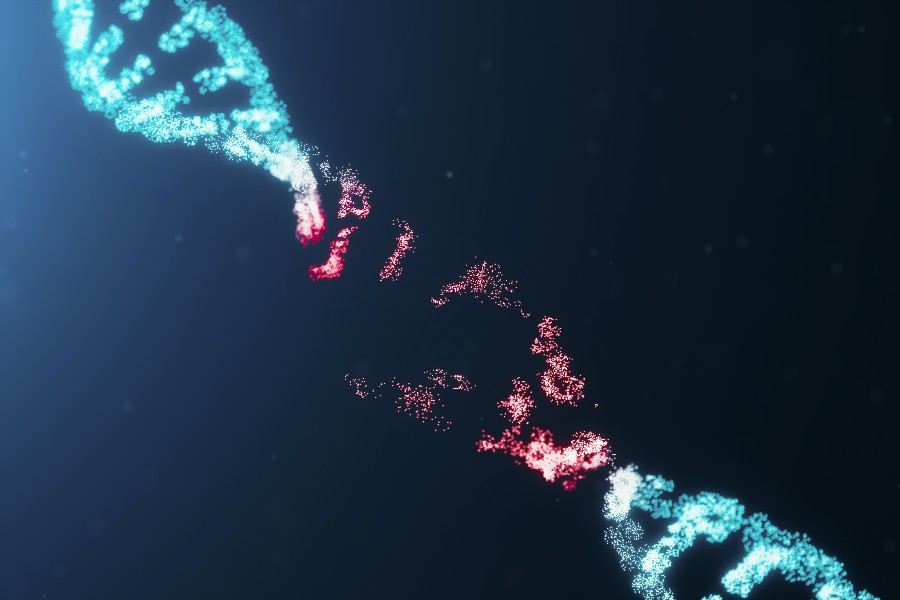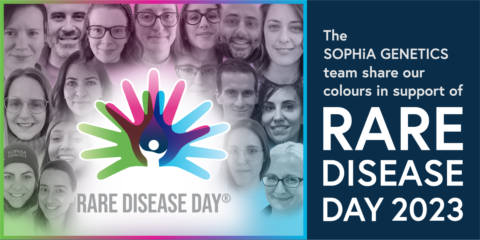Accelerating and empowering our customers’ clinical cancer research decisions with cost-effective, accurate and fast in-house results.
This week is marking one year from the official launch of the SOPHiA DDM™ Homologous Recombination Deficiency (HRD) Solution. This is a milestone to celebrate, as with the introduction of our SOPHiA DDM™ HRD Solution, we introduced a cutting-edge, novel approach to HRD detection and supporting clinical researchers in their decision-making.
What is Homologous Recombination Deficiency (HRD) and why does it matter in cancer?
Homologous Recombination (HR) is a cellular process that repairs double-stranded breaks (DSBs) arising from DNA replication process or resulting from the exposure to DNA-damaging agents. Homologous Recombination Deficiency (HRD) is a condition that hinders the ability of cells to repair the double-stranded DNA break damage, therefore ultimately triggering oncogenesis1.
Damaged or falsely repaired DNA double strands lead to the accumulation of genomic scars which can be assessed by means of a Genomic Instability (GI)1. Deficiency in one (or more) homologous recombination genes, increases the risk for multiple malignancies2, while HRD is identifiable in multiplecancer types4-7. Some of the Homologous Recombination Repair (HRR) pathways genes most prevalently involved in the HRD phenotype are: BRCA1, BRCA2, RAD51C and PALB2.
How does the SOPHiA DDM™ HRD Solution allow clinical researchers to accelerate HRD detection?
At SOPHiA GENETICS, we are leveraging target capture technology and low-pass Whole Genome Sequencing (WGS) to isolate somatic and germline mutations in HR-associated genes.This permits the end user to identify pathogenic variants, such as SNPs and Indels, that could be potential causes of HRD.
In a single workflow, the SOPHiA DDM™ HRD Solution combines identification of mutations in 28 homologous recombination repair (HRR) genes beyond BRCA1 and BRCA2.
The unique value proposition of the SOPHiA DDM™ HRD Solution lies in the possibility of HRD testing in a decentralized format, supporting accurate detection of HRD status in a simple and intuitive platform that reduces turnaround time and costs.
We are extremely proud of having designed a sample-to-report application as a powerful tool for data-driven decision making by HCPs for the benefit of the ovarian cancer patients globally. In 2022, our expert bioinformatics and technical implementation teams facilitated over 30 SOPHiA GENETICS Set-Up Programs, supporting rapid adoption of the workflow across the globe, demonstrating high analytical performance and customer benefit maximization leveraging the capabilities of the SOPHiA DDM™ Platform.
SOPHiA DDM™ HRD Solution: A commitment to science, our customers and the world.
We, at SOPHiA GENETICS, are committed to improving science and healthcare outcomes across the world, developing cutting-edge technologies for our global customers and partners. To mark this 1-year celebration, we spoke to one of our partners, Diagnosticos da America (Dasa), about their experience with the SOPHiA DDM™ HRD Solution. Here are some insights from our collaboration:
SOPHiA GENETICS and Dasa celebrate a great milestone: 2,000 samples analyzed in less than two years!
Dasa is the largest integrated health network in Brazil, serving more than 20 million patients per year through more than 250,000 medical partners. Dasa became one of the frontrunners, introducing SOPHiA GENETICS’s Solution for HRD as the first decentralized solution in Latin America.
“With such a large regional network, we needed a cost-effective HRD solution that helped improve our workflow efficiency. The decentralized approach of SOPHiA GENETICS has enabled us to increase our scalability and output – in less than two years, we’ve tested the HRD status of over 2,000 in-house samples. The powerful analytics of SOPHiA DDM™ have helped us to maximize genomic insights from these samples and advanced our clinical research capabilities.”, said Ana Gabriela, Dasa’s Genomic Business Unit Sr. Manager.
SOPHiA DDM™ HRD Solution: Going beyond BRCAness
SOPHiA GENETICS is expanding its capabilities by launching an extended Homologous Recombination Solution which allows to explore deficient HRR genes resulting in the HRD phenotype. The panel relies on high accuracy and coverage uniformity, while giving the user the ability to have their library ready for sequencing in 1.5 days.
Our extended solution delivers a comprehensive coverage of 28 genes involved in the HRR pathway, encompassing SNVs, indels and gene amplifications, while providing access to OncoPortal™ Plus, to classify variants leveraging evidence-based annotations from the JAX-CKB database.
Our aim is to expand our offerings in a platform-agnostic approach, that will further empower healthcare professionals to continuously improve their data-driven decision making.
We want to thank everyone who contributed to this success and looking forward to the next milestones to come. Together, we always achieve more!
References :
- Ngoi NYL, Tan DSP. ESMO Open 2021;6(3):100144.
- Mekonnen N, Yang H and Shin YK (2022) Homologous Recombination Deficiency in Ovarian, Breast, Colorectal, Pancreatic, Non-Small Cell Lung and Prostate Cancers, and the Mechanisms of Resistance to PARP Inhibitors. Front. Oncol. 12:880643. doi: 10.3389/fonc.2022.880643
- Biomarkers of Homologous Recombination Deficiency in the era of PARP inhibitors, C. Piombino, L. Cortesi, Vol. 2 (No. 2) 2022 June, Review, 138-148, doi: 10.48286/aro.2022.48
- Robson ME, Tung N, Conte P, et al. Ann Oncol 2019;30(4):558–66.
- González-Martín A, Pothuri B, Vergote I, et al. N Engl J Med 2019;381(25):2391–402.
- de Bono J, Mateo J, Fizazi K, et al. N Engl J Med 2020;382(22):2091–102.
- Mekonnen N, Yang H and Shin YK. Front Oncol. 202212:880643.
- Li, S., Wang, L., Wang, Y. et al. The synthetic lethality of targeting cell cycle checkpoints and PARPs in cancer treatment. J Hematol Oncol 15, 147 (2022). https://doi.org/10.1186/s13045-022-01360-x
- Testing for homologous recombination repair or homologous recombination deficiency for poly (ADP-ribose) polymerase inhibitors: A current perspective Thomas J. Herzog a,*, Ignace Vergote b, Leonard G. Gomella c, Tsveta Milenkova d, Tim French d, Raffi Tonikian e,1, Christian Poehlein e, Maha Hussain f












